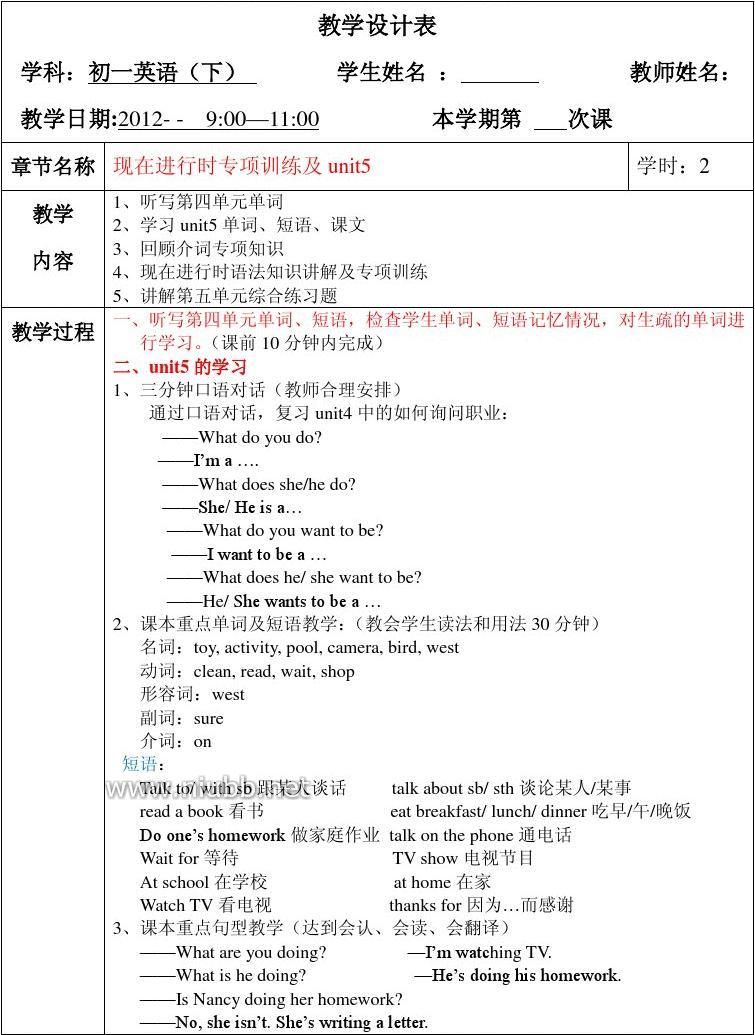大学数学教案范文

天津中学仁爱大学数学课堂部教案20112012学年第授课部门:英语课堂部培训学生:Young月29日全天、3月30日全天授课科目:新数学(第1一、授课内容及目标(一)授课内容的短文内容;第二,相关单元的语法点,主要包含人称名词以及相关方式(动词、宾格、形容词组物主从句、名词性物主代词、反身主语)、动词过去式、被动方式;第三,写作,主要介绍中英文书信格式的变化。(二)目标:通过培训,让学员熟悉相关单元的常识点(动词、短语、句型和词汇点)。此外,让学生认识中英文书信格式的变化,熟悉几种书信类型的常见表达。二、教学重点和难点Unit7中的purpose/aim/consideration/simply/complete/suit/bargain;中的tip/waiter/barber/wage/earn/decent/absolute/vary/customs。Unit1中的introduceoneself/have„common/leadgoodtime/dosth.;中的havedifficultydoingsth./askfor/have中的goshopping/makeupone’mind/try中的makeup/earn语法点:人称词尾及其相关形式(主语、宾格、形容词组物主从句、名词性物主代词、反身主语)、动词过去式、被动方式。

(二)难点:由于大多数学生即将长时间未接触英语英语的教案怎么写,而且年纪差距非常大,对这些年龄稍大的学生来说句子的记忆是一个难点。此外,两个句子怎样成为主从句和中英文书信格式的变化问题,都是学习的难点。三、教学方式:以校长讲授,学生听讲为主。辅以学生训练,对所学词汇和词义点进行巩固。四、教学具体方法MynamecomefromSichuanProvince.Weloveeatinghotfoods.camehereverynicemeetyouall.myhonorstandhereyourEnglishteacherfollowingtwodays.提问:What’smynameWhere’smefrom?Whatkindourfavourite?Didcomehereyesterday?HowmanydaysdoesourEnglishclasslast?(二)标语、常见英语词汇on(打开)----off(关)up(上)----down(下)push(推)open(营业)----closed(关门,下班)pauseleft(左)----rightentrance(入口)----exit(出口)menu(菜单)sale(出售)sale恕不出售danger(危险)poison(有毒)smoking/photos/visitors/entry(严禁吸烟/禁止拍照/游人止步/禁止入内)handsoff(请勿用手摸)keepsilence(保持安静)keepdry(保持干燥)(三)教材Unit(1)中西文化差异:A.姓、名排序变化:中国是“姓+名”,说英文的国家是“名+姓”;B.见面问候用语的差别:西方通常从“天气”说起,而通常不问“吃了吗?”。

(2)课文讲解。重点单词有:introduce/enter/tip/confident/contact/important/nickname,重点短语和语法有:Itdosth./havesth.goodtime/allowsb.dosth.(3)人称名词的几种常用格方式(动词、宾格、形容词组物主从句、名词性物主代词)(4)教学训练:课后第二题“Vocabulary”和第四题“Translation”英语的教案怎么写,并讲解。做题步骤和方法:先看题目,再找题目中的关键词语;带着关键词句回到原文中去找寻答案出现的范围;锁定范围后再带着问题仔细阅读,选出恰当答案。注意题目的排序跟原文的次序通常是一致的,后一个题的答案不可能在前一个题得答案的后面出现,只可能往后找。problem/difficulty/order/experience/restaurant/pleasant;重点短语和语法:havedifficultydoingsth./askfor/have时态问题:一般今天时(每次性的,真理的)例句:Healwayssleepverylate.Sunrises一般过去时V-ed例句:Icamehereyesterday.Tomtravelledabroadlastyear.do例句:Webigdinner现在完成时haveV-ed例句:Ihavefinishedmyhousework.现在进行时V-ing例句:Wepurpose/aim/consideration/simply/complete/suit/bargain;重点短语和语法:goshopping/makeupone’smind/try语法:一般今天时第一人称单数形式。

(第三人称单数除了人称代词外,只要是人以及事物、人名、地名之类只要是单数都是第一人称单数)例句:Johnplaysfootballeveryweek.Heoftenrunskeephealth.(3)教学练习:课后第二题“Vocabulary”和第四题“Translation”,并讲解。Text(1)课文讲解。重点单词:tip/waiter/barber/wage/earn/decent/absolute/vary/customs;重点短语和语法:makeup/earn(2)完成训练语法:被动方式。(3)教学训练:课后第二题“Vocabulary”和第四题“Translation”,并讲解。Text作为练习,并讲解,巩固做题步骤和方法。(四)英文书信格式差别及应留意的问题:“年月日”的顺序和口语的位置:英文习惯是“月日,年”的顺序,且写于书信的右上方(而美国是习惯于右下方);(顺带复习英语十二个月的相应词汇)落款:习惯以“Yourselfsincerely,”作为落款,可以在以下换行再加上写信人的姓名,也可以不加。amwritingThanksagainyourkindhelp.(感谢信)Pleaseallowmesaysorryagain.(道歉信)amlookingforwardhearingfromyousoon.Bestwishes概括:tosummarize,sumup,short举例:forexample,UnitOneLanguageLearningTeachingmaterial:NewHorizonCollegeEnglish:BookParticipants:FreshmenForeignLanguageTeachingObjectivesstudents’interestsparticipateactivelyletstudentsreflectownexperienceslanguagelearninglearningEnglishletstudentslearnimportantnewwordswritingskillstextletstudentsmasterwritingskills:cause-and-effectreadsentencesproperintonationletstudentsmasterreadingskills:makeoutunfamiliarwordsviacontextclues;comprehendlogicalorganizationIITeachingEmphasis&DifficultyTopicunderstandingcontentunderstandingstudents’readingability:understandcontextSpeakinglogicalthinkingIIITeachingApproachesTask-basedteachingwhile-readingprocedureformativeevaluationmethodsreadingteachingKeywordscontextvocabularyteachingIVTeachingProcedureTimeAllocation90min):Warm-up:IntroductionTopicunderstanding:Englishlearningonlinelearning(10ms)Intensivereadingstudy:Sectionpre-readingactivities:leadingwhile-readingactivities:comprehensionquestionswhile-readingactivities:textstructureanalysiswhile-readingactivities:studynewwords,expressionstypicalsentencepatternspost-readingactivities:writingskill(causeeffectpattern)Assignment(5ms)in-classreadingpassageafter-classreadingpassagesproverbsfrominternetaudio-visualmaterialssimulatedtestDetailedTeachingProcedureHaveyoueverwantedhavemorecontroloveryourowneducation?Now,freedomstudywhatinterestsyoupossiblethroughpersonalcomputers.unitintroduceyoufirstpassagetellshowonestudentlearnedEnglishusingsecondpointsoutqualitiesyouneedhelpyousucceedwhenstudyingcomputer.Studyingcomputermaybestdiscoveriesyourlife.YounewpioneersII.Topicunderstanding:Englishlearningonlinelearning(10ms)Studentsworkexchangeideasownexperienceeachotherfollowingtwoquestions.Teachergoesaroundstudents’reactionsaskseveralstudentspresentanswersowngroup.WhydoyoulearnEnglish?DoyouhaveanytroublelearningEnglish?any,whatMyparentswantmeEnglishspeakingcountry;makefriendspeoplewhospeakEnglish;myhobby;myjob;manyproblemslearningEnglish,pronunciation,grammarrules,culturalbackground.mostfrustratingonelargebodynewwords.III.Intensivereading:Sectioni.pre-readingactivities:Lead-in(5ms)Ask&answer:Whatdoyouknowaboutonlinelearning?Onlinelearning,distanceeducation,refersothersupportiveresourcesavailablethroughnetworkedcomputer.Internet,onlinelearningoftentakesplaceonlinelesson,computerdisplaysmateriallearner’srequest.ii.while-readingactivities:Comprehensionquestions(5ms)readthroughpassagequicklyeachquestion.Q1:Whatmadeauthor’sEnglishlearningjuniormiddleschoolverysuccessful?patientteacherherpositivemethodpraisingallstudents.Q2:WhatdoesonlineEnglishlearningrequireaccordingMuchtime,commitmentkeepupcourse.Q3:WhatinterestsauthormostaboutEnglishaccordinglastparagraph?Hecouldcommunicatemanymorepeoplethanbefore.iii.while-readingactivities:Textstructureanalysis(10ms)Studentsworkindividuallywholepassageseveralmajorpartsmainideaeachpart,seewhethersameideahavedifferentanswers.different,whosepassageshouldthreemajorparts:Mainidea:Learningforeignlanguagemostdifficultyetmostrewardingexperiencesmylife.PartII:Pare2-7MainbodyMainidea:languagelearningexperiences:juniormiddleschool,seniormiddleschool,collegeonlinelearningPartIII:Para.8ConclusionMainidea:Learningforeignlanguagehasbeenmosttryingexperiencewouldn'ttradeiv.while-readingactivities:Studylanguagepoints(newwords,expressionstypicalsentencepatterns)vocabularycheckcheckwhetherstudentshavedonefullpreparationnewwordspassage,somevocabularyexercisesgivenbeforenewwordsnewly-learnedwordsrightwhenreadingoldwordsgivenWorthdoingProvidinghelp,constructiveentering,entrancebeingdedicated—Sentenceanalysisstudentsself-learning,teachercangivesomedifficultsentencescangiveotherdifficultsentences,too.Soteachercanexplainhelpthemunderstandbetter.)times,learningwellworthwell:adv.在此起提出作用,意为:比较;很wellcontentjobtogetherwellworthsth./doingsth.rewardingenougheffort值得(做)类似的句式还有:1)dosth.worthwhiledoingsth.worthone’swhiledosth.eagerlyansweredallcould,neverworryingmuchaboutmakingmistakes.(Line句中“neverworrying”为目前分词副词作定语表示伴随。

Wheneverweansweredincorrectly,shepointedlongstickdown,shouted„(Line11)post-readingactivities:writingskill(causeeffectrelation)readparagraphfigureoutmainidea,tellhowauthordevelopshisidea.Topic:MylearningexperiencejuniormiddleschoolpatientteacherwhooftenpraisedallEffect:Becausepositivemethod,eagerlyansweredallcould,neverworryingmuchaboutmakingmistakes.myclasstwoyears.StudentsreadparagraphTopic:MylearningexperienceseniormiddleschooldifferentfromCause:Whilemyformerteacher„,mynewteacherquicklypunishedWheneveransweredincorrectly,„shouted,
做过调查吗